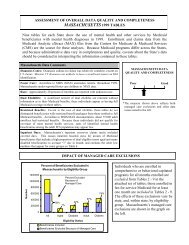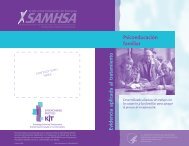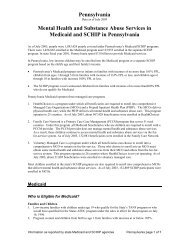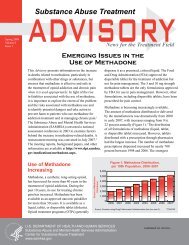Quick Guide for Clinicians - SAMHSA Store - Substance Abuse and ...
Quick Guide for Clinicians - SAMHSA Store - Substance Abuse and ...
Quick Guide for Clinicians - SAMHSA Store - Substance Abuse and ...
Create successful ePaper yourself
Turn your PDF publications into a flip-book with our unique Google optimized e-Paper software.
40 <strong>Substance</strong> <strong>Abuse</strong> Treatment: Group Therapy• Confidence. Leaders should be a model of theconsistency that comes from self-knowledge<strong>and</strong> clarity of intent while remaining attentive toeach client’s experience. This secure groundingenables the leader to model stability <strong>for</strong> thegroup.• Spontaneity. Good leaders are creative <strong>and</strong>flexible.• Integrity. Leaders should be aware of ethicalissues that arise.• Trust. Group leaders should be able to trust others,<strong>and</strong> vice versa.• Humor. The therapist needs to be able to usehumor appropriately.• Empathy. The ability to project empathy is anessential skill <strong>for</strong> the counselor.For more in<strong>for</strong>mation on these personal qualities,see pages 93--95 of TIP 41.Leading GroupsGroup therapy with clients who have histories ofsubstance abuse or addiction requires active,responsive leaders who keep the group lively <strong>and</strong>ensure that members are continuously <strong>and</strong> meaningfullyengaged with each other. The followingbehaviors <strong>and</strong> abilities are important when leadinggroups:• Leaders are able to vary therapeutic stylesbased on the needs of clients.
















